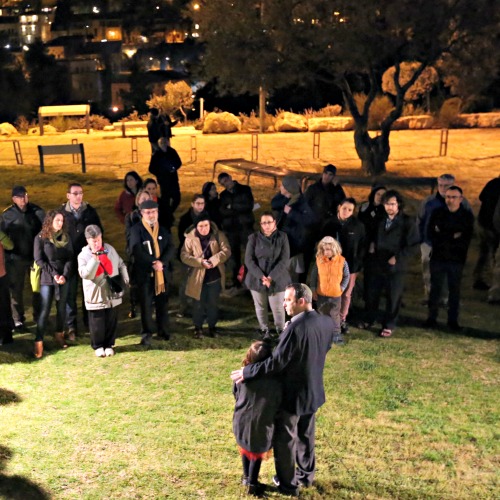Vandals Attack Holy Land’s Church of Dormition
In five years, 40 Christian and Muslim holy sites in the Holy Land have been damaged by extremists, reports an Israeli anti-hate coalition.

JERUSALEM — Israeli officials were again on the defensive Thursday, after arsonists damaged a Greek Orthodox seminary next to the Dormition Abbey church complex on Mount Zion in Jerusalem.
Last May, just before Pope Francis visited the Holy Land, vandals attacked Dormition Abbey, the site where the Virgin Mary is believed to have died.
The Feb. 26 attack marks the 40th attack on a Holy Land church or mosque since the end of 2009, according to Tag Meir, the largest Israeli grassroots organization working against hate crimes and racism in Israel.
The attackers, believed to be far-right-wing Jewish extremists, started a fire in the bathroom of the seminary’s annex. They scrawled “Redemption of Zion” and anti-Christian graffiti in Hebrew on the seminary’s stone walls.
A day earlier, vandals, also suspected Jewish nationalists, carried out a similar arson attack on a mosque near Bethlehem in the West Bank.
Both attacks caused damage but no injuries.
Israeli President Reuven Rivlin, who has made a big effort to meet with the country’s minority communities since taking office in July 2014, strongly condemned the arson during a phone call he made to Greek Orthodox Patriarch Theophilos III.
“It is inconceivable that an act like this could happen in a house of prayer. This is a heinous crime; there must be an investigation, and those responsible must be brought to justice,” the president told the patriarch, according to a statement.
“Such criminals not only threaten to set fire to places of worship holy to all of us, but ignite the regional powder keg upon which we all sit,” Rivlin said.
Israel’s foreign ministry said in a statement that Israel “condemns religious intolerance” and that the government “is committed to protecting the rights and freedoms of all its citizens, regardless of race, creed or beliefs.”
Saeb Erakat, Palestine’s chief negotiator, blamed both attacks on Israel’s “illegal occupation and colonization based on distorted religious claims.”
‘Price Tag’ Attacks
Far-right Jewish extremists have carried out hundreds of so-called “price tag” attacks designed to punish, or extract a price, from the Israeli government for limiting construction in Jewish settlements. The government has scaled back but not halted construction in the West Bank and East Jerusalem, disputed territory the Palestinians want as part of a future state.
On Feb. 26, groups of Jewish Israelis, including settlers, visited the site of the mosque attack to show solidarity with the villagers there.
That same night, about 50 Israelis, also Jewish, gathered in a grassy spot in the Old City of Jerusalem, not far from the torched seminary, to denounce violence and pressure the government to do much more to prevent such attacks in the future.
At the rally, a Christian cleric, who asked not to be identified due to the sensitive security situation, said the seminary attack is the third within three years against Christian sites on Mount Zion.
So far, the damage has been to holy property, not people, he said, but that could be the next step.
Following the rally, Gadi Gzaryahu, chairman of Tag Meir, the anti-hatred coalition of 40 Jewish organizations that organized the rally at very short notice, told the Register that the Jewish attackers “are trying to destroy good relations between Jews, Muslims and Christians. They’d like to believe that Jews agree with their actions, but they couldn’t be more wrong.”
“This is a desecration of God’s name,” he said.
Extremism Displayed
Hundreds of other attacks have been perpetrated against Arab-owned property, including vehicles, buildings and olive groves, as well as property belonging to the Israeli military.
Gzaryahu said Tag Meir decided to have the rally “to call on our government to find whoever carried out this evil attack. Unfortunately, even after all these incidents, no one has been placed on trial. No one is sitting in jail. Once in a while, the police arrest a few people and then release them. [The attackers] are terrorists and should be treated as such.”
The activist said there are “more than a few hundred” Jewish extremists either supporting or carrying out the price-tag attacks.
“A country that can locate a ship halfway around the world that is full of weapons and can track a single phone number in the middle of Gaza should be able to locate these evil extremists and prosecute them,” said Gzaryahu.
Israel Police spokesman Micky Rosenfeld said there are “police operations” in the West Bank and Jerusalem “on a regular basis to prevent and respond to these types of nationalist incidents with criminal motives” and noted that “arrests were made following previous attacks on churches in Jerusalem.”
Speaking to journalists after seeing the seminary’s damage with his own eyes on Thursday, Greek Orthodox Patriarch Theophilos III took a more diplomatic tone.
“The authorities are very much concerned. They have promised to take all the necessary steps in order to protect not only this property, but the whole area of Mount Zion, which is so important and holy for Jews, Christians and Muslims.”
Michele Chabin is the Register’s Middle-East correspondent.
- Keywords:
- catholicism
- christianity in the middle east
- holy land
- islam
- israel
- jerusalem
- judaism
- michele chabin
- vandalism
















